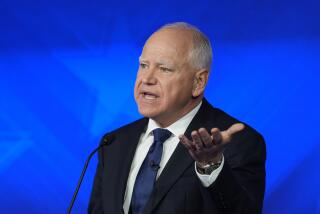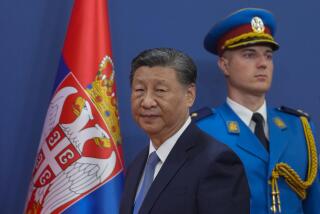Kohl Seeks China Contracts With No Tie to Rights Issue : Trade: German chancellor heads a delegation expecting to cash in. Moral tone is left to U.S.
- Share via
BEIJING — As President Clinton and Chinese President Jiang Zemin prepared to square off in Seattle this week over issues linking trade to human rights, German Chancellor Helmut Kohl arrived here Monday with top business leaders eager to sign several billion dollars worth of contracts that carry no human rights conditions at all.
Among the deals the Germans hope to clinch during their six-day visit are a $1.2-billion order for Airbus jetliners and a much-coveted $416-million contract to build a subway for Guangzhou, the booming South China metropolis.
Other pending contracts range from a fleet of luxury buses to an assortment of telecommunications equipment.
The entire package, say the Germans, totals more than $3.56 billion.
Occurring in the same week as the Seattle summit, the German voyage to China highlights what many find a disturbing aspect of U.S. foreign policy: The United States alone sets the moral tone for world affairs by placing human rights conditions on trade, while other countries pay only lip service and rake in the profits.
“The Chinese are doing their best to make the Americans see them courting the Germans, the Japanese and the Koreans,” said Anne Stevenson, Beijing director of the U.S.-China Business Council, an American lobby group opposed to using trade restrictions as instruments of foreign policy.
At present, the future of U.S. trade with China is tied to a May 28 executive order by Clinton requiring China to demonstrate “overall, significant progress” in several areas of human rights before its most-favored-nation trading status, essential for commerce between the two countries, can be renewed. Chinese efforts in these areas are scheduled to be reviewed by the U.S. State Department at the end of the year.
Kohl brings to Beijing a list of political prisoners to present to the Chinese leadership. But his 40-person delegation--including four government ministers and the captains of German industrial giants such as Daimler-Benz and Siemens--plans to spend little time debating ethical issues such as prison labor, Tibetan nationalism and religious persecution that are central to U.S. trade conditions.
“We do not think that we as a business corporation should get ourselves mixed into asking our Chinese partners for certain policies or procedures,” said delegate Edzard Reuter, chairman of Daimler-Benz. “That is their decision and they have to make it.”
But Reuter added that the German companies would not do business in China unless they were convinced that it had shown progress in creating a more open society. “We certainly are convinced,” Reuter said, “that the present Chinese government and the policies here are on line with opening their country, with introducing human rights in the way of introducing democracy.”
For this kind of attitude, the Chinese are grateful in a way that will help the German economy.
During an interview with German television taped before Kohl arrived, Chinese Premier Li Peng promised that the timely visit would pay off with handsome business deals.
“Chancellor Kohl is sure to fly back with full suitcases,” said Li, the 65-year-old leader known principally for his leading role during the 1989 crackdown in Tian An Men Square. “He is to be accompanied by a number of representatives of the German economy. They will also not go back empty-handed.”
A few hours later, aides to the Chinese premier tried to persuade German television correspondent Lutz Mahlerwein to drop the quote, saying that it gave the misleading impression that Kohl and his entourage would be rewarded personally for coming to China. Mahlerwein refused, and the interview was aired intact.
Officials in the Chinese Foreign Ministry had prepared for the visit by lauding the Germans for canceling a proposed deal last January to sell submarines and frigates to Taiwan, adopted home of the exiled Chinese Nationalist movement.
“We appreciate the position the German government has taken, such as refusing to sell arms to Taiwan and adhering to its (Bonn’s) policy of ‘one China,’ ” Foreign Ministry spokesman Wu Jianmin said last Thursday. “This action will undoubtedly contribute to Sino-German cooperation in all areas, including the economic and trade field.”
This ability to skirt confrontation with China has put Germany, which is already China’s top trading partner in Europe, in position to win the contract to build the Guangzhou subway over rivals from France and Britain.
France was eliminated because it agreed to sell Mirage jet fighters to Taiwan. Although favored initially by Guangzhou authorities, Britain, embroiled in a dispute with the Chinese about the future of Hong Kong, was apparently eliminated after the Chinese central government intervened on behalf of Germany.
Despite the non-confrontational poses in Beijing, Kohl’s visit is not without controversy back home.
Norbert Gansel, a member of the opposition Social Democratic Party, spoke for many German politicians when he said recently: “The trip is embarrassing because the host, Li Peng, is the one mainly responsible for the Tian An Men massacre. There is no reason for Kohl to go to China as a commercial traveler.” Kohl met with Li for 2 1/2 hours Monday night.
Handelsblatt, Germany’s national economic daily, characterized the visit as an election gambit by Kohl aimed at the 1994 state and federal elections in Germany: “What is better in the middle of a recession and shortly before election year 1994 than to return from a country with fat economic growth and bring home fat order books.”
In the lead-up to the Seattle summit between the Chinese and U.S. leaders, the Kohl visit received equal or bigger billing in the Chinese press.
Chinese newspapers began heralding Kohl’s visit on their front pages a week before his arrival. “Welcome Premier Kohl!” said a writer for the Chinese Economic Daily in an article that reverently detailed the German leader’s daily routine and hobbies. “He takes a nap in order to work in high spirit in the evening. . . . He dresses simply but pays much attention to food, is especially fond of Chinese and Italian food. He is good at tasting wine.”
Researchers Ulli Seibert in Bonn and Christian Retzlaff in Berlin contributed to this report.
More to Read
Sign up for Essential California
The most important California stories and recommendations in your inbox every morning.
You may occasionally receive promotional content from the Los Angeles Times.










